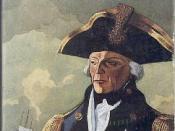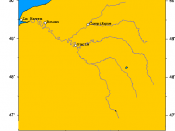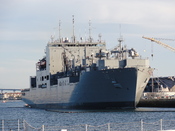Lord Hornblower starts out in a chapel while the Dean of Westminster was preaching. While there, an uniformed naval lieutenant had made his way into the chapel and told Hornblower that his lordship would like to speak with him. When he got outside, St. Vincent was awaiting him. There, Hornblower was told he would start active duty that night. His orders were to suppress the mutiny on the ship "Flame"ÃÂ.
Later that day, he met up with his wife and son and told them all that he was allowed about his orders. The three of them left their home and set off to Smallbridge. They said their good-byes as Hornblower boarded his ship. Hornblower went straight to his cabin to find that it wasn't very spacious, although they were the finest quarters in the brig. His cabin also had a bad smell. There was a penetrating smell of cheese and a perceptible smell of rats.
There was also a smell of wet clothing and a mixture of human odors.
Once the ship set sail, Hornblower was slung around his cabin since he had not yet gotten his sea legs back. Luckily he was thrown towards his cot. The wooden ship creaked and crackled with the vessel's motion in the water. He described the noise as that of a mouse inside of a violin while it was being played.
Later that week, they found themselves at Cape dee lay Heave. There they found "Flame"ÃÂ. Then Hornblower boarded "Flame"ÃÂ and started negotiations with Nathaniel Sweet, captain of the ship. Hornblower offered the people on the ship a fair trial if they should surrender the ship and stop the mutiny. Sweet tuned down the offer and Hornblower returned to "Porta Coeli"ÃÂ furiously.
As they sailed on, gunboats attacked them. The first one was sunk because the shots went to the gunboat's bottom after piercing the side. The other one was hit just as hard, lying at the surface with the remains of her crew swimming by her. Whoever had been in command of those boats must have been a reckless fool to expose their frail vessels to a real war vessel. Now "Porta Coeli"ÃÂ was chasing "Flame"ÃÂ. "Porta Coeli"ÃÂ reloaded its guns and prepared to attack "Flame"ÃÂ.
Hornblower and his boarding crew jumped aboard the ship. Brown led the strike waving a cutlass and Hornblower followed with pistol in hand. Then they boarded "Flame"ÃÂ. On board, men from the "Flame"ÃÂ were fighting with Hornblower and his crew so they wouldn't lose their lives. In this struggle, Nathaniel Sweet was killed. Now Hornblower had "Flame"ÃÂ under his control.
Now at Le Harve, Hornblower got on land and borrowed an officer's horse. Then Hornblower entered the city where he dismounted his horse. Then a horseman carrying a white flag galloped his way. This horseman gave Hornblower information that the soldiers were in the barracks and the main guards are at the gates. Now Hornblower marched the streets with the band blaring behind him. Then Hornblower met with the mayor and, they celebrated over the fact that Bonaparte no longer ruled them.
Then Hornblower received the news that the Duke would be coming. Then the ship the Duke was on arrived. First off the boat were the side boys followed by officers in full dress. Then came the Duke, a tall stiff man in a hussar uniform. Then Hornblower greeted the Duke. Then they boarded their horses and rode the Church of Our Lady, where they were provided shelter form the cold. Then Hornblower sent Bush on a mission to see that Bonaparte wouldn't strike a blow at Le Harve.
Later that day, Hornblower was reading the newspaper as he felt his bed jar slightly. He paid almost no attention to it as he heard the door stealthily open. He opened up to see Brown peering into the door, while Howard and Dobbs had made their appearance behind him. Howard told Hornblower that there had been an explosion. That meant Bush must have been successful. He must have captured the French powder barges and blew them up. Later, Hornblower found out that Bush had died in the explosion.
The next day the Duchess approached Hornblower and brought him a surprise. It was his wife, Barbara, which Hornblower had to look at twice before he could believe his eyes. He thought it was a pleasant surprise although he had always disapproved of captains and admirals who had their wives with them on active service. Hornblower got on the carriage with the royal pair as they made their way to the hotel. At the hotel, Hornblower and Barbara caught up on what they had missed out on. The next day at breakfast Hornblower found out that there were no French soldiers in Rouen. This meant that there could finally be peace. Hornblower then told Howard to get "Flame"ÃÂ and "Porta Coeli"ÃÂ ready to sail. Horblower would take the Duke, Duchess, and Barbara with him to Rouen.
They arrived at Rouen around afternoon where a sergeant greeted them. Then Hornblower asked to meet with the mayor. Hornblower was starting to get mad since the Duke and Duchess were not treated with the royal standards. That night, Hornblower found out that the war was finally over. Hornblower decided the Duke must be told so he told him himself.
The next day Hornblower received a parchment document that said that he had been given a higher title such as Lord Hornblower of Smallbridge. Then Barbara told Hornblower of the offer she had received. She had been asked to be hostess to her brother Arthur, Duke of Wellington. Hornblower thought it was a great offer, but he would not join her. He urged her to go without him and she decided she would. Then an old friend approached them. It was the count and Marie, the two people who helped him and Brown escape from France.
After Barbara left for Vienna, Hornblower and Brown decided to go to Gracay, where Marie and the count lived. Hornblower and Brown had arrived at Gracay where Marie and the count were waiting for their arrival. That night, they played a couple games of whist. When Marie went to bed, Hornblower and the count played piquet. The next day, Brown entered Hornblower's bedroom and told him that he wanted to get married to a woman named Annette. Later that week Brown got married to Annette. After the ceremony, Hornblower got the news that Bonaparte had escaped from Elba and made his way to France. He had claimed the throne in France once more. This meant that Bonaparte would be after Hornblower and since the count had helped Hornblower escape, he would be in danger too. They decided they had to leave for the coast.
Hornblower, Marie, Brown, Annette, the count all left for the coast. They would need five horses for the five of them. On their way they stopped at Nevers, a garrison town and contained no troops. There they spoke with the Duchess. Hornblower asked if she thought France had enough strength to stop Bonaparte. She insisted that Bonaparte was the most hated man in the country and that the people would fight. Then they left Nevers and got ready to hide out as long as they had to.
The next day they found themselves on a forest track. There they found a dead soldier with a note on fastened to his chest. This note said that the count, Marie, and Hornblower were being looked for. The poor soldier was a man named Paul-Marie, the man who had been waiting for them. They must leave him unburied just because they wouldn't know they had come that way. The group continued down the trail when they came to a river. Marie tried to cross the river but the current was too strong. They decided they must go on until they find a place they could cross.
The five men and women rode on until they came to a small farmhouse. There they found a boat but it was in bad shape since the hussars smashed the boat. They decided to repair the boat and cross the river. Marie kept a watch on the highroad from the vineyard. They were only about 30 minutes away from being done with the repairs when Marie came riding down from the vineyard. They knew that this could be the end. The hussars would find the repairs in the boat and start searching for them. They rode back to a hollow that they had rode by before and hid there. Soon the hussars were searching for them. They all got out their weapons and prepared to fight for their lives.
An officer tried to persuade Hornblower to surrender and offered them a fair trial, but Hornblower turned down the offer without hesitation. Hornblower could now hear bullets passing by his head. Then he heard the impact of a bullet on Marie's thigh. The great artery of her thigh was torn. Hornblower tried to stop the bleeding as a bullet struck his shoulder. Then he heard a French voice say she was dead. The struggle was over and Marie was dead. Then Hornblower was taken to the hussars' headquarters.
The men were taken to their chambers. Then Hornblower was asked if he had any requests. All Hornblower wanted was a bath, a shave, and some clean clothes. While getting his shave he kept on thinking about grabbing the razor and slitting his throat but he must let Bonaparte kill him. Then the court-martial assembled and the count and Hornblower were sentenced to death. They were to be shot at dawn the next morning. Hornblower then thought about Marie and how he let her die. The next morning Hornblower was approached by the count. The count told him that the emperor had been defeated and that the executions would not take place that morning. Then the aide-de-camp said something about His Most Christian Majesty, but Hornblower did not listen to him. His thoughts were on his wife Barbara and his son Richard.
THE END





